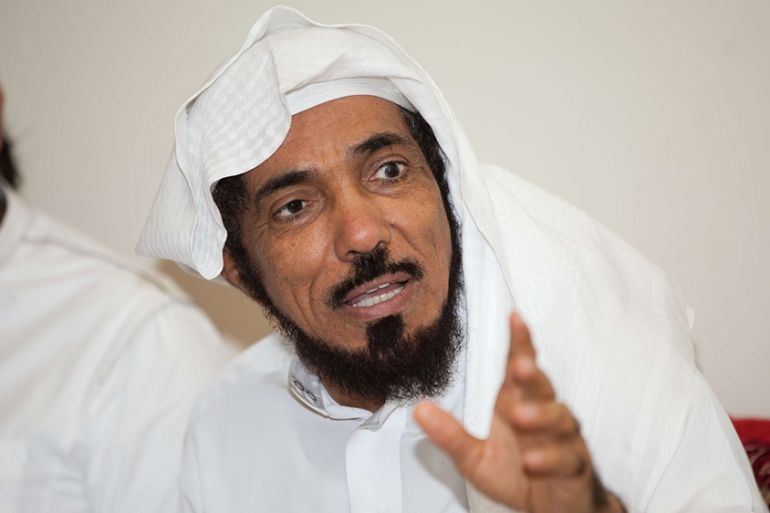Trial of Saudi scholar Salman al-Awdah postponed, says son
Scholar’s son says trial pushed back for months after father was due in court as public prosecutor seeks to execute him.

The trial of Saudi Muslim scholar Salman al-Awdah was postponed until December as it was set to begin in an antiterrorism court after nearly two years of pre-trial detention, his son said.
Al-Awdah, who faces the death penalty, was expected to appear in the Criminal Special Court in Saudi Arabia’s capital, Riyadh, on Sunday.
Keep reading
list of 4 itemsPalestinian Prisoner’s Day: How many are still in Israeli detention?
‘Mama we’re dying’: Only able to hear her kids in Gaza in their final days
Europe pledges to boost aid to Sudan on unwelcome war anniversary
But his son, Abdullah, said on Twitter the session was postponed for five months.
“Update in regard to the trial of my father in which the Saudi attorney general is seeking death penalty against him because of his activism. The session has been postponed for several months from today,” he said.
It was the second such postponement this year in the case of the cleric, who was arrested in September 2017 as part of a widening crackdown on dissent in the ultraconservative kingdom.
My father was not brought to the court and the session was postponed.
The next session is going to be in December.#سننقذ_سلمان_العودة— د. عبدالله العودة (@aalodah) July 28, 2019
Global support
In a statement on Friday, Amnesty International said it feared for al-Awdah’s life.
“We are gravely concerned that Sheikh Salman al-Awdah could be sentenced to death and executed,” said Lynn Maalouf, Amnesty’s Middle East research director.
“Since his arrest almost two years ago, Sheikh al-Awdah has gone through a terrible ordeal – including prolonged pre-trial detention, months of solitary confinement, incommunicado detention, and other ill-treatment – all flagrant violations to his right to a fair trial.
“The Saudi authorities continue to claim that they are fighting ‘terrorism’ when this trial …[is] clearly politically motivated and meant to silence independent voices in the country,” she added.
The news also elicited strong support from his followers around the world. As many took to social media, the Arabic hashtag We_Will_Save_Awdah went viral.
“They want to kill the voice of reason to let ignorance prevail,” one of his supporters said on Twitter.
“Disagreeing with someone over his opinions and ideas, does not justify planning for his execution, unjustly,” said another supporter on Twitter.
Reformist scholar
Al-Awdah is a renowned Saudi Islamic scholar in his early 60s described by UN experts as a reformist.
He gathered supporters from around the world and boasts more than 14 million followers on Twitter. While his social media accounts remain active, his last tweets were posted in September 2017, the month he was arrested.
He faces the death penalty for a number of charges, including stirring public discord and inciting people against the ruler, according to his son Abdullah.
The cleric also faces charges for alleged ties with the Muslim Brotherhood in addition to his public support for imprisoned dissidents, according to a State Department document on the country’s human rights practices for 2018.
According to Amnesty, al-Awdah was arrested a few hours after posting a tweet welcoming reports of a possible reconciliation between Saudi Arabia and Qatar.
Saudi Arabia, the United Arab Emirates, Bahrain, and Egypt cut off all diplomatic and economic ties with Doha in June 2017, accusing it of not following their regional policy direction. Qatar says it practises an independent foreign policy and will continue to do so.
The cleric’s family have said Saudi authorities demanded al-Awdah and other prominent figures publicly back the kingdom in the blockade, but he refused.
Two other arrested Saudi scholars, Awad al-Qarni and Ali al-Omari, also face the death penalty.
The kingdom executed 37 of its citizens in April for what it said were “terrorism-related crimes”, publicly nailing at least one of the bodies to a pole as a warning to others.
At least 100 people have been executed in Saudi Arabia since the beginning of the year, according to official data released by the official Saudi Press Agency.
Last year, the oil-rich Gulf state carried 149 executions, according to Amnesty, which said only Iran executed more people.
|
|